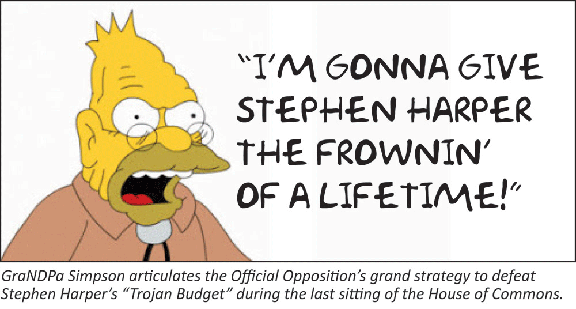 |
|
| Half measures, pandering and posturing are the best enemies a fascist could have | |
|
“The doctrine that the cure for the evils of democracy is more democracy is like saying that the cure of crime is more crime.” H.L. Mencken, American journalist
gregfelton.com Stephen Harper’s fascist grip on Canada was not established suddenly or by force. It developed gradually over six years in full public view, and largely with the public’s acquiescence, even approval. As we know, a sufficient number of Canadians voted to give Harper a majority in the May 2011 election simply because they deemed frequent voting for minority governments to be too much of an inconvenience. As such, Harper’s pre-meditated destruction of Canada’s democracy, however imperfect it may have been ante tyrannidem, is a tragedy in the proper sense of the word—it could have been prevented, but since it’s too late to talk about prevention, what, if anything, can now be done about it? A lot, actually, provided that Parliament’s defenders have the will to do what is necessary. The Parliamentary Options (For the record, no Canadian politician has ever been impeached or censured, but that doesn’t mean it couldn’t happen. The last British politician to be impeached was Henry Dundas, 1st Viscount Melville, for misappropriation of public funds in 1806. He was later acquitted.)
The best Parliamentary hope, therefore, lies with the governor-general, Canada’s appointed head of state who traditionally represents the Crown. The position has been formally independent of the British monarchy since 1947, yet there are still wingnuts who claim that Queen Elizabeth II, herself, wields ultimate political authority in Canada. The G-G’s main function is to ensure that Canada always has a prime minister to lead a government; however, the role of the prime minister is not constitutionally defined. Elections notwithstanding, it is the G-G who selects the prime minister, not the governing party or the electorate. Because the G-G appoints the prime minister, the prime minister can also be summarily dismissed (disappointed?). This happened after the 1896 general election when the Earl of Aberdeen refused to recognize Sir Charles Tupper as prime minister after he failed to earn a majority. Missed opportunity Jean had no obligation to accede to his wish. Since Canada had recently had an election, a coalition would have held a de facto majority in the House, and would have been more representative of the electoral will. Therefore, she should have asked Liberal leader Michael Ignatieff to form a government, distasteful as that might have been. In the end, after making Harper cool his heels for 2.5 hours, she acquiesced, and during the following two-month hiatus the Harperites used fear mongering and character assassination to sabotage the coalition—opportunity lost. Had Jean done the right thing, we would at least have been spared the fascistic Bill C-38. What is to be done? For example, the NDP could support a nation-wide, write-in petition to have Governor-General David Johnston remove Harper as prime minister. If the petition garnered enough signatures, the pressure might well be sufficient to force Johnston to act, given that his duty is to protect Parliament and the Canadian public. At a minimum, opposition MPs could publicly denounce Harper and his ruling cabal as fascist and rally the public to support radical remedies for his removal. To date, neither of these measures has been tried. Instead, the NDP, the defenders of Parliament, has chosen to allow Harper to dictate the terms of debate and to martyr themselves for their own ideals, as the following example shows. CASE STUDY: For most of its history, the NDP has been an electoral also-ran that projected the image of a champion of the working classes, and behaved as the moral conscience of the nation. It got away with this self-indulgent posturing because it had no foreseeable hope of having to make good on its rhetoric. Now, Parliament is under attack, and the NDP suddenly finds itself as the Official Opposition, but instead of defending Parliament it persists in spouting banalities, stating the obvious, and posturing for the masses. On May 15, 2012, House Leader Nathan Cullen issued in the following e-mail to supporters about the NDP’s plans to oppose Bill C-38: Cullen correctly identifies the problem (“ram[ming] hundreds of pages of harmful measures through Parliament—without adequate study or debate”), but then admits to political impotence—“It comes down to all of us, working together, to hold them accountable.” What does Cullen expect the mass public to do?! Why should they have to do anything? It’s the politicians’ job to hold the government accountable.
It became increasingly obvious as the evening droned on that this “budget review” was a PR stunt to preach to the converted, spout the requisite platitudes and nostrums, and posture for the next election, all the while claiming to stand up for Canada. At length, I got to the microphone and addressed the MPs collectively:
At the end of this farce, which lasted about three hours, I went up to new Quebec MP Charmaine Borg to ask her if she’d at least be prepared to stand up in the House to denounce Harper as a fascist. She couldn’t run away fast enough. MP Fin Donnelly listened politely as I emphasized the folly of trying to defeat Harper in the House, but clearly was not prepared to do anything useful. Planning for failure and succeeding First, these dedicated champions of democracy presented more than 500 amendments in a non-stop, 25-plus-hour sitting. As if to underscore the magnitude of the personal sacrifice they were making on our behalf, NDP MPs sent out e-mail updates on the state of the debate, such as this June 12 dispatch from Deputy Finance Critic Guy Caron:
We put forward hundreds of amendments on this budget bill – practical amendments that reflect the concerns of Canadians and protect the things you care about most. So far, in an unprecedented abuse of their majority, Conservatives have voted against every single one. They continue to ignore the concerns of Canadians as they force through their reckless agenda. But we’ll keep standing up for the things that matter to you, and we won’t back down. [my emphasis] Stephen Harper’s political games and reckless agenda have just changed this country – and Canadians are angry. We asked the Conservatives to listen to the tens of thousands of Canadians like you who spoke out against this budget. And we put forward hundreds of practical amendments to stand up for the things you care about most.… Now we need to gear up for the next fight. To take on Stephen Harper—and win. Your donation of $25, $50 or whatever you can afford, will send Stephen Harper a clear message: we don’t want his Canada. [my emphasis] Fascism didn’t invade Canada; it was let in the front door by the very people we entrusted to keep it out. In the name of honesty, the NDP should send out the following e-mail: “Dear Canadians: “In this difficult time, as we fight to protect the country against Stephen Harper’s totalitarianism, we will do everything safe and traditional to show you that we care: We will reflect back to you what you already know. We will insult Harper. We will give repetitive, passionate speeches. We will claim the moral high ground. But, even though Harper is destroying the environment, consumer protection, civil liberties, and pretty much everything that makes Canada a decent society, we will not do anything tangible to stop him. Any such action would take us out of our comfort zone. “The NDP does not recognize any tactic beyond fighting elections, because we don’t respect the value that unelected bodies bring to our democracy. Therefore, we will make no appeal to the governor-general or to the courts to stop Harper, much less inform you that such valid avenues exist. We will also not denounce Harper as a fascist or a traitor, because that wouldn’t be polite, and politeness is so much more important than the truth. Even if such an appeal were successful, it could come back to hurt us when we form government, and that’s really all that matters, right? “So, until the next federal election, we will continue to cry, protest, posture and be your voice in Ottawa, even though we know the government doesn’t have to care. It’s the thought, and your political contributions, that count.” | |||||||||||||||||


